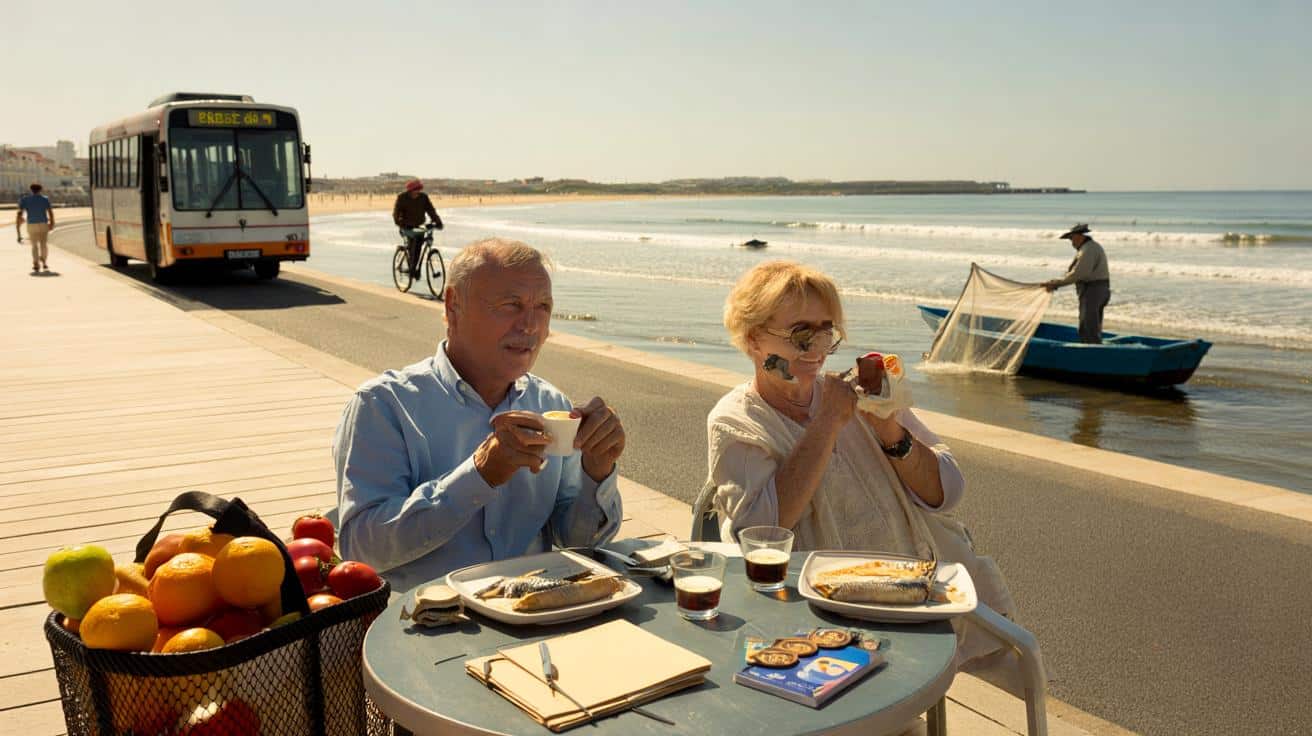A British state pension, a modest private top-up, and a quiet wish for warmth. That’s the mix nudging a wave of retirees to Portugal’s coast. The surprise is where they’re landing. Not the glossy Algarve postcards, but a long, breezy stretch of sand two hours south of Porto where living on **£770 a month** doesn’t feel like a stunt. It feels… doable.
A fisherman in a wool cap hosed down his boat, salt on his sleeves, while a café owner slid trays of warm pastéis across a counter that smelled like butter and espresso. Old men argued about football, then fell quiet for the first sip.
I watched a retired couple split a menu do dia for €9 and linger over it like a ritual. Bills and budgets seemed to soften in the salt air. The numbers stop shouting. And yet, the arithmetic is what makes this place sing. One detail kept repeating in conversations. A simple figure. A promise in pounds.
It was £770.
Why this seaside city is suddenly on British lips
Ask locals and they’ll tell you straight: **Figueira da Foz** is a beach town with a working rhythm. Not flashy, not sleepy. It sits where the Mondego river meets the sea, with the old quarter pressed up against a promenade of pale boards and giant skies. For decades it drew Portuguese families from the interior. Now you hear English more often in the queue for bread, and it’s not tourists. It’s people looking for a gentler cost of life, not a cheaper version of home.
Mary and Alan from Kent put it simply. They pay €520 for a bright one-bed in Buarcos, ten minutes’ stroll to the water. Their monthly shop hovers around €160 if they lean on the market—glossy tomatoes, sardines in paper, oranges heavy as cricket balls. A coffee is €1.10. A bus pass is €30. They keep a notebook of little wins: €9 lunches, €6 haircuts, electricity under €70 in spring. “We don’t feel poor,” Mary told me. “We feel light.”
The magnetism isn’t magic. It’s math plus atmosphere. Rents lag behind the Algarve and Lisbon’s orbit, yet you still get a sea breeze and a café culture that rewards lingering. The town is flat enough for easy walking and cycling. Healthcare options exist in both the public SNS system and private clinics, and train lines stitch Figueira to Coimbra in under an hour. When you strip the month to its bones—rent, food, utilities, transport, a little healthcare—you can land close to that £770 line without turning life into a spreadsheet contest.
How to actually live on £770 a month here
Start with housing. Look beyond the postcard front row and you’ll find honest rentals tucked a street or two back from the surf. Older walk-ups often run €450–€600 for a one-bed if you’re willing to paint a wall and ignore a fussy wardrobe. Aim for Buarcos, Bairro Novo, or out towards Tavarede for value. Negotiate gently for long-term contracts outside high summer. A six or twelve-month lease trims anxiety and price. Watch for included bits—appliances, strata fees, water in the bundle—because those nudge the month either side of calm.
Food is where your budget breathes. Build your week around the municipal market and the menu do dia. Fish on Tuesdays when landings are biggest. Batch-cook feijoada on a drizzly afternoon and your next two lunches appear without thinking. Keep a café as your living room—order one galão and read for an hour—and you’ll spend less than heating a big house in Kent. Let’s be honest: no one actually weighs every tomato or tracks every receipt forever. The trick is a few dependable habits, then life takes the strain.
Healthcare and admin need a clean lane in that £770. If you’re resident, you can access the SNS with a Número de Utente and use private clinics for speed. Basic private cover for retirees varies with age and medical history; many pay €50–€120 monthly for peace of mind, or go pay-as-you-go with €35–€60 GP consults. Learn the visas that fit post‑Brexit life: the D7 for passive income, or longer stays within the Schengen 90/180 rule if you’re testing the waters first.
“We gave ourselves six months,” Alan said. “One suitcase each, a rented flat near the sea, and a promise that if it didn’t feel right, we’d go home without drama.”
- Target rent: €450–€600 for a one-bed, 10–15 minutes from the beach.
- Monthly food: €150–€200 with markets and menus do dia.
- Utilities and internet: €90–€120 depending on season.
- Transport: €0–€30 if you walk, bike, or grab a bus pass.
- Healthcare buffer: €50–€120 for insurance or clinics.
What this really feels like, week to week
The rhythm is small and human. You wake early because the shutters leak light, and the air has that Atlantic clean you can taste. A neighbour hands you a bag of lemons over the balcony with a shrug that says, take them, don’t make it weird. You walk the boards and watch surfers practicing the same wave like a prayer. We’ve all had that moment when the heart and the spreadsheet argue; on this beach they call a truce. Not perfection. Not paradise. Just a life that costs what you can pay, and gives more than you expect.
| Key points | Detail | Reader benefit |
|---|---|---|
| City choice | **Figueira da Foz** offers seaside living with rents often €450–€600 for a one-bed | Realistic path to live near the ocean on a modest budget |
| Monthly budget map | Rent, food, utilities, transport, healthcare can sit near **£770 a month** with smart habits | Clear breakdown for planning and peace of mind |
| Practical steps | Long-term leases post-summer, market shopping, menu do dia, simple private healthcare | Actionable moves that cut costs without cutting joy |
FAQ :
- Is £770 really enough for a single retiree?Yes if you keep rent around €500, lean on markets and €9–€10 lunch menus, and use public transport. A small healthcare buffer is key.
- Which neighbourhoods should I look at first?Buarcos for beach proximity at calmer prices, Bairro Novo for charm, and Tavarede for value and buses into the centre.
- What visa fits a long stay after Brexit?Many retirees use the D7 (passive income) for residency. For a trial, stay within the Schengen 90/180 rule before committing.
- How does healthcare work for foreigners?Residents can register with SNS and mix in private clinics for speed. Budget €50–€120 monthly for insurance if you want cover.
- Is English widely spoken?Enough for daily life in cafés and shops, more in clinics and with younger people. Learning basic Portuguese unlocks everything.









